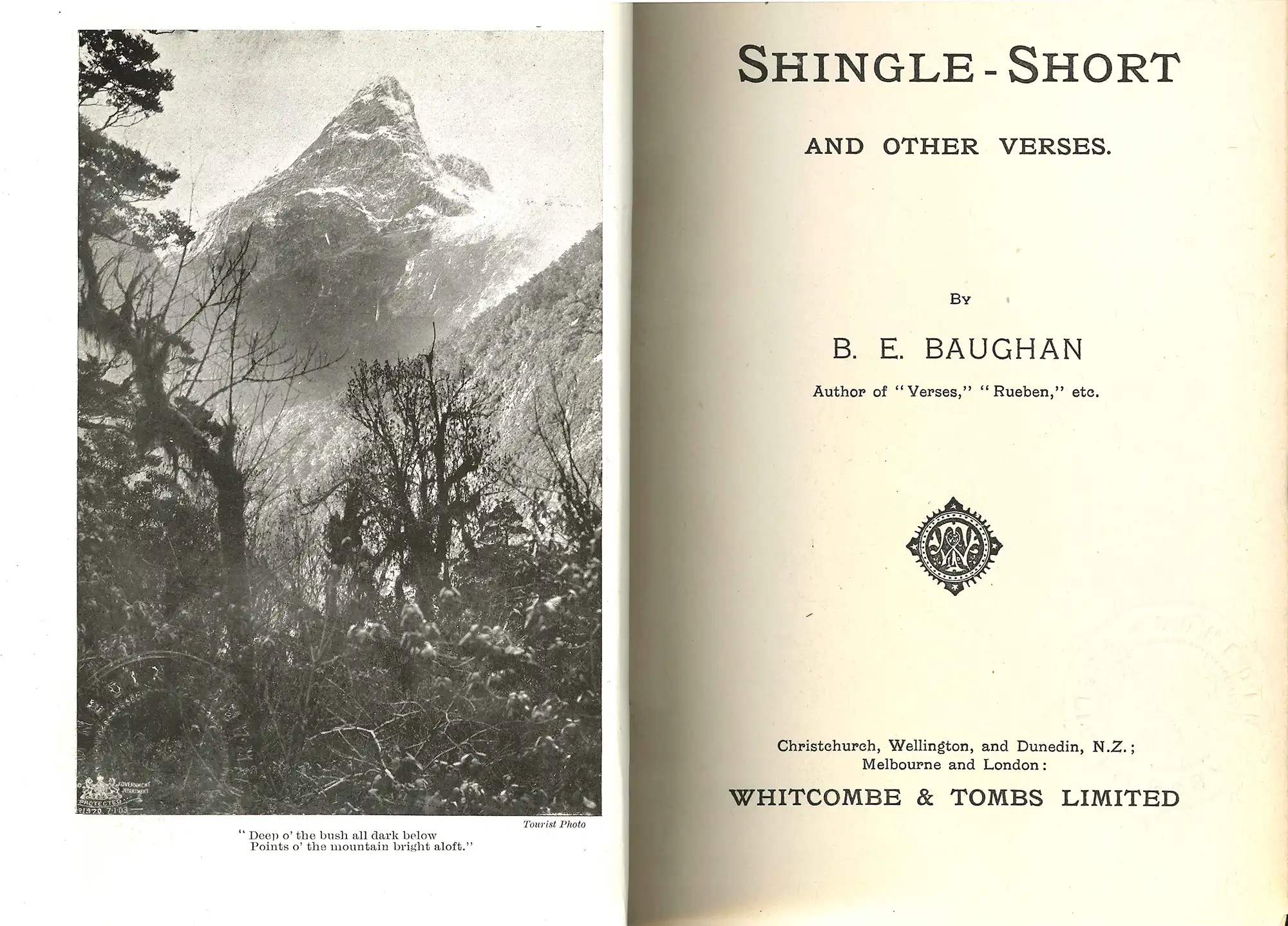Case W2
- Blanche Baughan

Blanche Baughan. Shingle-short and other verses. Christchurch: Whitcombe & Tombs, 1908.
Blanche Baughan (1870-1958) was born and educated in England where she gained a tertiary degree from the University of London in 1891. From her student days she was actively involved in the suffrage movement in England. She gained employment in social work, which experience led her towards social reform.
Baughan wrote her first poetry before she emigrated to New Zealand in 1900 at age 30. Based in the Canterbury region, she sought to establish a style of verse relevant to a new colony. Her poetry and prose often contains the voices of ordinary, unpretentious people.
She also wrote popular accounts of walking and alpine climbing throughout New Zealand with a natural history, especially botanical, focus.
In later life Baughan became a prominent advocate for prison reform and a staunch opponent of capital punishment.
![Blanche Baughan. Brown bread from a colonial oven: being sketches of up-country life in New Zealand. Christchurch: Whitcombe & Tombs, [1912?]](https://www.reedgallery.co.nz/__data/assets/image/0011/668441/W2b.webp)
Blanche Baughan. Brown bread from a colonial oven: being sketches of up-country life in New Zealand. Christchurch: Whitcombe & Tombs, [1912?]
Blanche Baughan (1870-1958) was born and educated in England where she gained a tertiary degree from the University of London in 1891. From her student days she was actively involved in the suffrage movement in England. She gained employment in social work, which experience led her towards social reform.
Baughan wrote her first poetry before she emigrated to New Zealand in 1900 at age 30. Based in the Canterbury region, she sought to establish a style of verse relevant to a new colony. Her poetry and prose often contains the voices of ordinary, unpretentious people.
She also wrote popular accounts of walking and alpine climbing throughout New Zealand with a natural history, especially botanical, focus.
In later life Baughan became a prominent advocate for prison reform and a staunch opponent of capital punishment.
![Blanche Baughan. Brown bread from a colonial oven: being sketches of up-country life in New Zealand. Christchurch: Whitcombe & Tombs, [1912?]](https://www.reedgallery.co.nz/__data/assets/image/0011/668441/W2b.webp)
Blanche Baughan. Brown bread from a colonial oven: being sketches of up-country life in New Zealand. Christchurch: Whitcombe & Tombs, [1912?]
Open image in new window
![Blanche Baughan. The finest walk in the world. Second edition. Christchurch: Whitcombe & Tombs, [1913?]](https://www.reedgallery.co.nz/__data/assets/image/0003/668442/W2c.webp)
Blanche Baughan. The finest walk in the world. Second edition. Christchurch: Whitcombe & Tombs, [1913?]
Blanche Baughan (1870-1958) was born and educated in England where she gained a tertiary degree from the University of London in 1891. From her student days she was actively involved in the suffrage movement in England. She gained employment in social work, which experience led her towards social reform.
Baughan wrote her first poetry before she emigrated to New Zealand in 1900 at age 30. Based in the Canterbury region, she sought to establish a style of verse relevant to a new colony. Her poetry and prose often contains the voices of ordinary, unpretentious people.
She also wrote popular accounts of walking and alpine climbing throughout New Zealand with a natural history, especially botanical, focus.
In later life Baughan became a prominent advocate for prison reform and a staunch opponent of capital punishment.
![Blanche Baughan. The finest walk in the world. Second edition. Christchurch: Whitcombe & Tombs, [1913?]](https://www.reedgallery.co.nz/__data/assets/image/0003/668442/W2c.webp)
Blanche Baughan. The finest walk in the world. Second edition. Christchurch: Whitcombe & Tombs, [1913?]
Open image in new window

![Blanche Baughan. Brown bread from a colonial oven: being sketches of up-country life in New Zealand. Christchurch: Whitcombe & Tombs, [1912?]](https://www.reedgallery.co.nz/__data/assets/image/0011/668441/W2b.webp)
![Blanche Baughan. The finest walk in the world. Second edition. Christchurch: Whitcombe & Tombs, [1913?]](https://www.reedgallery.co.nz/__data/assets/image/0003/668442/W2c.webp)